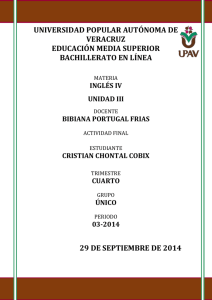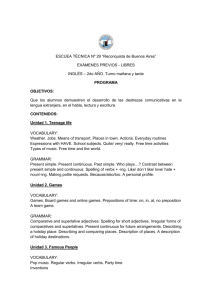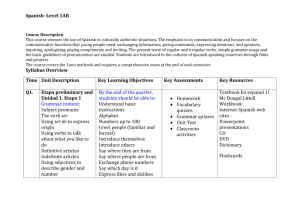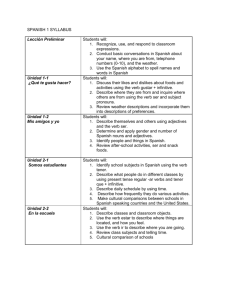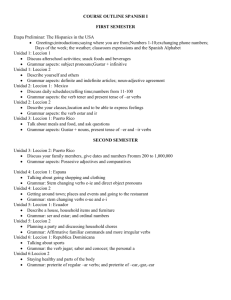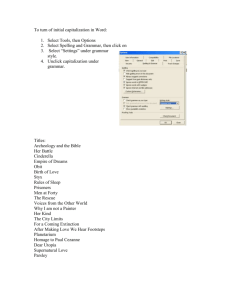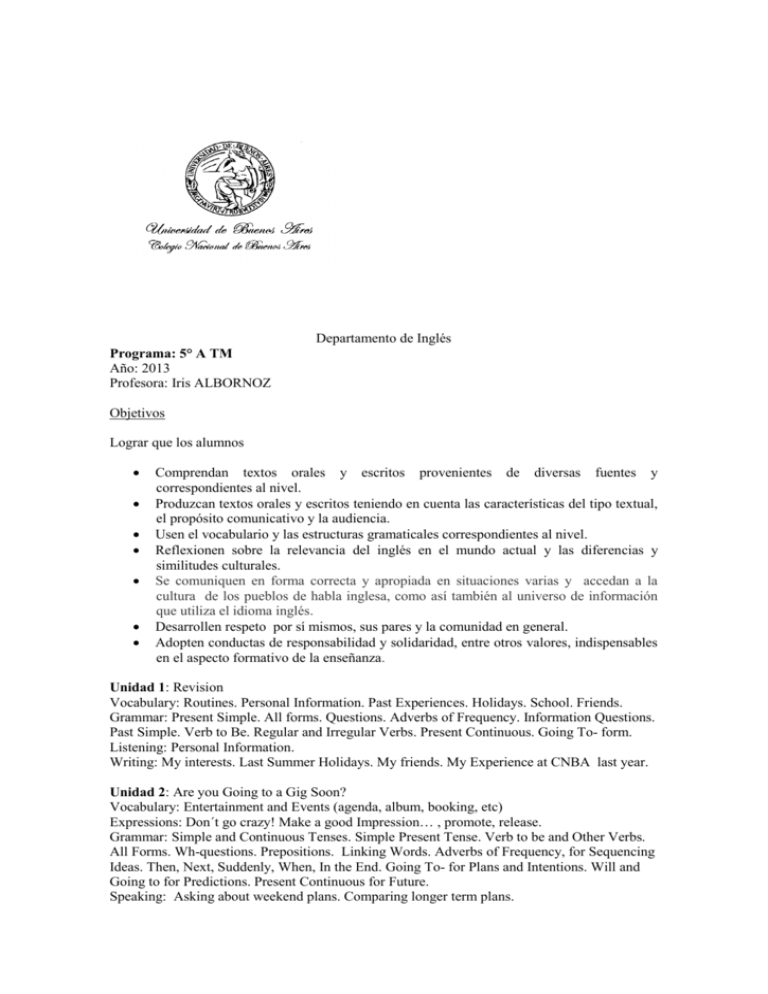
Departamento de Inglés
Programa: 5° A TM
Año: 2013
Profesora: Iris ALBORNOZ
Objetivos
Lograr que los alumnos
Comprendan textos orales y escritos provenientes de diversas fuentes y
correspondientes al nivel.
Produzcan textos orales y escritos teniendo en cuenta las características del tipo textual,
el propósito comunicativo y la audiencia.
Usen el vocabulario y las estructuras gramaticales correspondientes al nivel.
Reflexionen sobre la relevancia del inglés en el mundo actual y las diferencias y
similitudes culturales.
Se comuniquen en forma correcta y apropiada en situaciones varias y accedan a la
cultura de los pueblos de habla inglesa, como así también al universo de información
que utiliza el idioma inglés.
Desarrollen respeto por sí mismos, sus pares y la comunidad en general.
Adopten conductas de responsabilidad y solidaridad, entre otros valores, indispensables
en el aspecto formativo de la enseñanza.
Unidad 1: Revision
Vocabulary: Routines. Personal Information. Past Experiences. Holidays. School. Friends.
Grammar: Present Simple. All forms. Questions. Adverbs of Frequency. Information Questions.
Past Simple. Verb to Be. Regular and Irregular Verbs. Present Continuous. Going To- form.
Listening: Personal Information.
Writing: My interests. Last Summer Holidays. My friends. My Experience at CNBA last year.
Unidad 2: Are you Going to a Gig Soon?
Vocabulary: Entertainment and Events (agenda, album, booking, etc)
Expressions: Don´t go crazy! Make a good Impression… , promote, release.
Grammar: Simple and Continuous Tenses. Simple Present Tense. Verb to be and Other Verbs.
All Forms. Wh-questions. Prepositions. Linking Words. Adverbs of Frequency, for Sequencing
Ideas. Then, Next, Suddenly, When, In the End. Going To- for Plans and Intentions. Will and
Going to for Predictions. Present Continuous for Future.
Speaking: Asking about weekend plans. Comparing longer term plans.
Writing: a Flyer for an event.
Unidad 3:What Will the World Be Like? The Environment. Life in the Future.
Vocabulary: development, environment, challenge, crime, oil, poverty, employment…/built-in,
well equipped/ generate, predict/ Expressions: I hope so, I Hope no/ You must be joking! …
Grammar: “Will” or “Going to” . All Forms and Uses.
Reading: Newspaper Articles.
David Swan by N. Hawthorne in “Complete Course in English”.
Listening: Environmental Issues. Boston Futuretech Conference
Unidad 4: Could It Be a Masterpiece?
Vocabulary: Materials and Shapes. Works of Art: masterpiece, graffiti, sketch…/signature…
Designer,annual, up- and- coming…/ Expressions: Worth a fortune, unauthorized image…
Grammar: Modals for Deduction . Must, might, may, can, could (not) +be.
Listening: Match a Description to a Photograph.
Writing: Description of a Picture.
Reading: Mrs Bixby and the Colonel’s Coat by R Dahl.
Unidad 5: What Have you Been Doing?.
Vocabulary: Festivals. Marathon, Sculpture, honour/ carve, attend, perform, careless, careful…
Grammar: Present Perfect Simple and Continuous. Present Perfect with already, yet, just.
Game: Guess What I´ve been Doing!
Reading: Newspaper Article about Festivals In Brazil and Argentina.
Writing: Describing Festivals and Celebrations.
Listening: It might be You. Song by Stephen Bishop
Unidad 6: Travelling. If the Passenger next to you is Like his…
Vocabulary: Travelling by Plane. Homesick, Phobic, Chaotic… / Miss, remind, frighten…
Expressions: a goog deal, go out parting, etc.
Grammar: Zero and First Conditionals. Future Sentences with when, even if, as soon as,
…Advice and Warnings with unless/ in case/ even if/ otherwise.
Reading: Tea by Saki
Bibliografía Obligatoria
-Seligson, P. Essential English. Coursebook 4 Intermediate. (2010) Richmond-China
- “From the Cradle to the Grave” Short Stories. Edited by Clare West (1993) OUP.
-Dixon, R. “Complete Course in English 4” (2000) Prentice Hl Regents, Englewood Cliffs. UK.
-“Discovering Fiction” Student´s Book 1. Cambridge University Press (1997) Cambridge. UK.
-Mignani, A. “Sweet and Sour”. ( 2001) Black Cat Pusblishing- Cibed. Canterbury.
-Mignani, A. “The Splintering Frame”. (2001) Black Cat Publishing. Cideb.Canterbury
Bibliografía de Consulta
- Murphy, R. “English Grammar in Use. Intermediate” (1997) CUP. Cambridge.
-Fowler, W.S.”Test and Practise your English”. Beginners to Intermediate. Nelson. Hong Kong
-English Grammar at http://www.edufind.com/english/grammar/grammar_topics.php
COLEGIO NACIONAL DE BUENOSS AIRES
DEPARTAMENTO DE INGLÉS, 2013
PROGRAMA DE 5TO AÑO, NIVEL B, TURNO MAÑANA
PROFESORA: JULIETA CARMOSINO
EXPECTATIVAS DE LOGRO.
Se espera que los alumnos logren:
Comprender textos orales y escritos provenientes de diversas fuentes y
correspondientes al nivel.
Producir textos orales y escritos teniendo en cuenta las características del tipo
textual, el propósito comunicativo y la audiencia.
Usar el vocabulario y las estructuras gramaticales correspondientes al nivel.
Desarrollar una actitud crítica frente a los materiales presentados en tanto
representantes de características culturales.
Reflexionar sobre la relevancia del inglés en el mundo actual.
UNIDADES DIDÁCTICAS:
Unidad 1:
Contenidos gramaticales:
Revision of Tenses. Special Uses: Simple Present for running commentaries,
Present Continuous for annoying habits, Simple Present for lively retellings,
Present Continuous to express determination, etc. Dynamic and State verbs:
implications for the continuous form. Past tenses used in narrative sequences.
Expressions to talk about the future: is likely to, is expected to, is to, is prone to.
Contenidos lexicales:
Employment and unemployment.
Money
Verbs, nouns and adjectives related to money.
Idioms: money.
Phrasal Verbs approached through the PARTICLE. Different kinds of Phrasal
Verbs. Phrasal Verbs with two particles.
Unidad 2:
Contenidos gramaticales:
Reported Speech. Reporting dialogues. Summarising information and rewording
it
to report a message.
Revision of Conditionals. Mixed Conditionals.
Passive Voice. Cases with two objects in the active sentence.
The Article. THE, A, AN, ZERO. Special Cases.
Used to / Be Used to / Get Used to.
Word order in indirect questions.
Contenidos lexicales:
Truths and Lies.
Reacting to events
Idioms: lying.
Phrasal Verbs approached through the PARTICLE. Different kinds of Phrasal
Verbs. Phrasal Verbs with two particles.
Collocations with HAVE / GET / TAKE / LOSE / KEEP / PUT / COME / GIVE
/ CATCH / PAY / CHANGE / REACH.
Unidad 3:
Contenidos gramaticales:
The Subjunctive. Wish. It’s time… I’d rather you… As if / As though.
Relative Clauses. Whose. Cases in which THAT can be omitted.
Clauses. Different Types.
Comparatives. Far / Much / A lot / Slightly / a little / a bit + comparative.
“Should have” to express regrets.
Contenidos lexicales:
Relationships.
Discrimination and inclusion.
Phrasal verbs with BE / HAVE / PUT / TELL / KEEP / CATCH / TAKE and
GIVE.
Idioms related to relation.
A lo largo de las 3 unidades arriba descriptas se trabajarán las 4 macro-habilidades
lingüísticas. Asimismo, se utilizarán los tipos de textos para la comprensión y
producción listados a continuación:
Formal and informal letters / e-mails
Narratives: Unabridged Short Stories and short novels.
Reports
Poems
Description of people, objects and places.
Formal and Informal Conversations
Presentations
Authentic TV programmes and films
Essays
Narratives
DISTRIBUCIÓN DEL TIEMPO: Cada Unidad didáctica se desarrollará en el término
de
1
trimestre.
EVALUACIÓN. CRITERIOS E INSTRUMENTOS:
Para la evaluación se seguirán los criterios que se desprenden de los objetivos de cada
nivel y de los contenidos de cada unidad didáctica específicamente. Estos contenidos
específicos contemplan las 4 macro-habilidades, la gramática, el vocabulario y las
funciones lingüísticas.
La calificación final de los trimestres se desprenderá de las notas de los trabajos
prácticos, orales y escritos y las pruebas escritas ambos sobre los contenidos de las
unidades didácticas o sobre los textos seleccionados para análisis literario.
BIBLIOGRAFÍA
Del alumno:
“The Terrible Screaming”, Janet Frame
“The Waste Land”, Alan Paton
“The Wasteland”, T.S. Eliot
Blake, W. “The Chimney Sweeper” en Songs of Innocence
Zephaniah, B. Face
Albee, E. The American Dream
Freedom Writers (Dir. R. LaGravenese)
Brassed Off (Dir. M. Herman)
Secrets and Lies (Dir. M Leigh)
Material compilado por la Profesora del curso con actividades para el trabajo de las 4
macro-habilidades y de los contenidos lexicales y gramaticales para cada unidad
didáctica. Las actividades y los textos orales y escritos son seleccionados de la libros
detallados en la bibliografía del docente.
Del docente:
Carter, R. and M. McCarthy (2006). Cambridge Grammar of English. A Comprehensive
Guide. Spoken and Written English Grammar and Usage. Cambridge: Cambridge
University Press.
Cunningham, S. & P. Moor (1999) Cutting Edge. Upper Intermediate. England:
Longman.
Harmer, J. & R. Rossner (1992). More Than Words. Book 1. London: Longman.
Hook, J. N. (1981) Two-Word Verbs in English. New York: Harcourt Brace &
Company.
Jeffery, P. & M. Lloyd (2004) Framework. Level 4. UK: Richmond Publishing.
McAndrew, R. and R. Martinez (2001). Taboos and Issues. Boston: Thomson Heinle
Language Teaching Publications.
McCarthy, M. & F. O’Dell (1994) English vocabulary in Use. Upper-intermediate &
Advanced. Cambridge: CUP
Moutsou, E. and S. Parker (1996). Enter the World of Grammar. Book 5. London: MM
Publications.
Vince, M. (2003). Advanced Language Practice. Oxford: Macmillan.
Yule, G. (2009). Oxford Practice Grammar Advanced. Oxford: Oxford University
Press.
COLEGIO NACIONAL DE BUENOS AIRES
DEPARTAMENTO DE INGLÉS, 2013
PROGRAMA DE 5º AÑO , NIVEL A - TURNO TARDE
PROFESORA: FABIANA SANTAMARINA
EXPECTATIVAS DE LOGRO:
Que la/os estudiantes:
- reconozcan y comprendan comunicativamente las estructuras gramaticales y el
vocabulario desarrollado en las diferentes unidades de trabajo, tanto en instancias
escritas como auditivas.
- interaccionen utlizando dichos items gramaticales y
comunicativa y fluidamente, tanto de manera oral como escrita.
de
vocabulario
- aborden textos sin adaptación y de diferentes fuentes (textos literarios, artículos
de diarios, literatura científica o de negocios) pudiendo obtener información general
y específica de los mismos.
- desarrollen y utilicen estrategias que les permitan el seguimiento de una
exposición, la participación en la clase y la toma de apuntes durante la misma.
-
generen vínculos positivos de trabajo en el grupo y con el docente.
UNIDADES DE TRABAJO:
UNIDAD 1 (Newspaper articles - The Guardian, The New York Times, The
Independent, BBC International News / “New Opportunities, Education for Life”Upper Intermediate. Students’ Book: Module 1 - Lesson 2 and Module 2 - Lesson 6
/ “Intermediate Language Practice”, Units 4 and 5).
. Grammar Focus: revision of past tenses (Simple Past, Simple Past Progressive). Past
Perfect / Past Perfect Progressive. Progressive vs Simple tenses.
. Vocabulary: Newspapers: headlines, captions and news stories / Floods and accidents /
The Pope and The Catholic Church.
. Reading: “Deadly Rains Flood Capital, Greater BA” (Wed 3rd April 2013) /
“Argentina Floods: Dozens Die as Rain Continues” / “CFK declares three days of
mourning after storm leaves dozens dead” (Wed 3rd April 2013) / “Macri urges national,
BA province gov’ts to get hands on hydraulic works” // “Bombs at the Boston
Marathon” / “2nd Suspect in Boston Marathon attack captured alive after manhunt” //
“Breaking: Cardinal Jorge Mario bergoglio of Argentina – Pope Francis – is elected” /
“Pope orders Vatican officials to tackle child sex abuse scandals” / “Cardinals pick
Bergoglio, who will be Pope Francis” / “What does a Pope do?” / “Papal Succession:
your stories” / “Catholic Church: Glossary of Terms”.
. Speaking: exchanging personal information / asking and answering questions / giving
information about you / retelling / expressing views and opinions.
UNIDAD 2 (“Intermediate Language Practice”, Units 2, 3, 6 and 7 / “Real
Listening and Speaking 2”, Unit 10: The Weather is Changing / “Business
Vocabulary in Use. Advanced. Unit 43: Green Issues)
. Grammar Focus: revision of all present tenses (Simple Present, Present Progressive,
Present Perfect) with all their notions // get - become // revision of comparative and
superlative adjectives.
. Vocabulary: The Weather / The Environment / Green Issues.
. Reading: “27 years since Chernobyl and what have we learned?” / “How does an
Earthquake Trigger Tsunamis Thousands of Kilometers Away?” by Larry Greenemeier
/ “Predicting Natural Disasters” an article by Florin Diacu / Green Issues (from
Business Vocabulary in Use. Advanced).
. Listening: “The Weather is Changing”, a news programme. Presentation / people
giving opinions (Unit 10. “Real Listening and Speaking 2”).
. Speaking: commenting, expressing views and opinions: In my opinion / Personally /
I’m not an expert but... / I think we should... .
UNIDAD 3 (“Market Leader. Intermediate Business English Course Book. New
Edition”, Unit 1: Brands and Unit 6: Advertising / “English File, UpperIntermediate. Student’s book”, File 7- lesson B: Made in the USA)
. Grammar Focus: Articles (the / a-an / zero article) / Passives.
. Vocabulary: Business English: Brands - Advertising / words that go with brand and
product / words and expressions for talking about adverstising.
. Reading: “Outsourcing Production” - newspaper article, Financial Times /
“Successful Advertising”- newpaper article, Guardian / “McDonald’s. The Man Who
Destroyed Mealtimes” (text on text book) / “Commercials with a Gay Emphasis are
Moving into Mainstream Media” (web article).
. Listening: people talking about being pro-brands or anti-brands / An Interview with a
Brand Consultant / An Interview with the head of planning at an advertising agency / a
song.
. Speaking: talking about favourite brands / discussing authentic product promotions /
asking for opinions / agreeing – disagreeing / discussing authentic advertisements /
discussing good and bad advertising practices.
. Video: “LOGORAMA” (2009) - a short animation film directed by the French
animation collective H5, François Alaux, Hervé de Crécy and Ludovic Houplain.
. Writing: an opinion piece / Exercises in “Market Leader. Intermediate Business
English Practice File. New Edition”, Unit 1: Brands and Unit 6: Advertising.
UNIDAD 4 (“New Opportunities, Education for Life”, Upper-Intermediate.
Students’ Book. Module 4, Lesson 14)
. Grammar Focus: The Passive / Modals for making deductions about the present and
about the past (may, might, must, could / may, might, must, could + have + past
participle).
. Vocabulary: words and expressions to talk about characters and events in films and
stories / personality adjectives / reacting to events / making deductions.
. Reading: web page and biography of Ray Bradbury / a biography of Alfred Hitchcock
/ web page articles on “The Birds” by Alfred Hitchcock.
. Extensive Reading: “Prologue and Epilogue”, “Kaleidoscope”, “The Last Night of
The World” by Ray Bradbury (from “The Illustrated Man”).
. Video: “The Birds” a film by Alfred Hitchcock (1963).
. Speaking: describing characters and their reactions / making deductions and
speculating about situations / talking about products and processes / retelling stories /
expressing views and opinions.
. Writing: Exercises in “New Opportunities, Education for Life”, Upper-Intermediate.
Language Powerbook. Module 4, lesson 14.
DISTRIBUCIÓN DEL TIEMPO:
1er Trimestre - Unidades 1.
2do trimestre - Unidades 2 y 3 ( Brands / video).
3er Trimestre - Unidad 3 (Advertising) y Unidad 4.
EVALUACIÓN:
CRITERIOS:
Las expectativas de logro propuestas / el tiempo real de clase asignado, la profundidad y
la práctica realizada sobre los distintos items en las unidades de trabajo / la respuesta del
grupo de estudiantes a los distintos items gramaticales y de vocabulario presentados
(logros y dificultades).
INSTRUMENTOS:
Trabajo oral en clase (grupal, en pares e individual) / asignación de tareas a realizarse en
el hogar (entregadas para su corrección - trabajo individual o en grupos) / asignación y
presentación de trabajos prácticos especiales (trabajo invidual, en pares o grupal) /
evaluaciones escritas individuales.
BIBLIOGRAFÍA:
. De lectura del alumno / de trabajo en clase:
-
Newspaper articles (provided by the teacher and the students).
-
“New Opportunities, Education for Life”, Upper-Intermediate. Students’ Book.
Module 1 - Lesson 2, Module 2 - Lesson 6 and Module 4 - lesson 14. Michael
Harris, David Mower, Anna Sikorzynska. Pearson Longman.
-
“Intermediate Language Practice”, Units 2 to 9. Michael Vince. MacMillan
Heinemann.
-
“Real Listening and Speaking 2”, Unit 10: The Weather is Changing. Sally Logan
and Craig Thaine. Cambridge English Skills. Cambridge.
-
“Business Vocabulary in Use. Advanced”, Unit 43: Green Issues. Bill Mascull.
Cambridge Professional English.
-
“Market Leader. Intermediate Business English Course Book. New Edition”, Unit 1:
Brands and Unit 6: Advertising. David Cotton, David Falvey, Simon Kent. Pearson
Longman.
-
“Market Leader. Intermediate Business English Practice File. New Edition”, Unit 1:
Brands and Unit 6: Advertising. John Rogers. Pearson Longman.
-
“English File, Upper-Intermediate. Student’s book”, File 7- lesson B: Made in the
USA. Clive Oxenden and Christina Latham-Koening. Oxford.
-
“The Illustrated Man”, Ray Bradbury. Flamingo Modern Classics.
. De consulta del alumno:
-
“New Opportunities, Education for Life”, Upper-Intermediate. Language
Powerbook. Michael Harris, David Mower, Anna Sikorzynska. Pearson Longman.
-
Longman’s Learners Dictionary of Contemporary English. Advanced. New Edition.
Longman.
-
“Oxford Bilingual Dictionary”. Oxford University Press.
FILMS:
“The Birds” by Alfred Hitchcock. 1963.
Departamento: Inglés
Asignatura:Inglés
Curso: 5to año Nivel B Turno Tarde
Año: 2013
I- Objetivos: Que el alumno
-Desarrolle una actitud de confianza con respecto a sus posibilidades de aprender una
lengua extranjera respetando los diferentes ritmos y estilos de aprendizaje, y
reconociendo el error como constitutivo del aprendizaje
•Pueda construir el conocimiento lingüístico y pragmático- discursivo para la
comprensión y la producción de textos escritos y orales a partir de situaciones
contextualizadas y significativas
• Reflexione acerca del funcionamiento del lenguaje
• Construya espacios de articulación entre la lengua extranjera y las otras disciplinas
II- Contenidos:
Unidad 1:
Grammar: Revision of all tenses,stative verbs, word patterns, articles, synonyms, be/get
used to
Vocabulary: wordbuilding; multipart verbs with up and down, collocations, metaphors,
key topic vocabulary(people and relationships, transport, free time activities, hobbies,
occupations)
Functions: Preferences, describing people, telling jokes
Writing: argumentative essay, reports.
Reading: short stories, articles, matching headings and paragraphs, scanning for specific
information
Listening : predicting, identifying location, understanding attitude, listening for specific
information
Speaking: talking about family, comparing, making suggestions, expressing uncertainty
Literature: Short story “A case for the Defence” by G. Greene . Play “ An inspector
calls” by J.B Priestley.
Unidad 2:
Grammar: passive voice, verb patterns, reporting, reporting verbs, indirect questions,
question tags, connectors
Vocabulary: idiomatic language, multi-part verbs with on and out, confusable words,
key topic vocabulary(the media, communications, the weather, food and drink, travel
and tourism)
Functions: agreeing and disagreeing, clarifying and asking questions, giving and asking
for advice
Writing: a letter of application, a description
Reading: poetry, texts with paragraph gaps, answering questions
Listening : identifying roles, listening for gist and specific information
Speaking: talking about experiences, speculating, agreeing and disagreeing, giving
examples
Literature: ; Novel :Cry Freedom by John Briley. Short story : A sound of Thunder” by
Ray Bradbury
Unidad 3:
Grammar: conditionals, modals, relative clauses, result clauses
Vocabulary: multi-part verbs with off and over , collocations, wordbuilding, key topic
vocabulary(science and technology, entertainment, education, health and fitness)
Functions: polite requests, justifying arguments, making suggestions
Writing: a formal letter
Reading: summarizing, completing texts with sentence gaps
Listening : a song, taking lecture notes, identifying situations and people
Speaking: a topic presentation, discussing photos and texts, problem solving
Literature: , Play “Lady Windermere´s fan” by. O. Wilde; Short story: “The fly”
III- Bibliografía Obligatoria:
Steve Taylore- Knowles. Laser B1+ Student´s Book (2008)Ed. Macmillan Hellas,
Greece
Steve Taylore- Knowles. Laser B1+Activity Book (2008)Ed. Macmillan Hellas, Greece
Steve Taylore- Knowles. Laser B1+ CD-ROM (2008)Ed. Macmillan Hellas, Greece
Michael Vince. First Certificate Language Practice (2003)Ed. Macmillan Education,
Oxford
Kildaff, Hamer, Mc Cannon “Working with short stories” (1999)Ed. Cambridge
University Press. United Kingdom
J. B. Priestley. An inspector calls.( 1992) Heinemannn, England
Oscar Wilde .The plays of Oscar Wilde (1997) Ed. Wordsworth, Great Britain
Briley John. Cry Freedom (2010). Oxfrod University Press
IV- Bibliografía de consulta y/o complementaria:
-Vince, Michael. “Advanced Language practice”
Prof. Carmen Restuccia
Universidad de Buenos Aires
Colegio Nacional de Buenos Aires
Departamento: Lenguas extranjeras
Asignatura: Ingles
Curso: 5to C TT
Año: 2013
Docente: María Verónica Pernbaum
I- Objetivos: se espera que los alumnos logren.
-
Utilizar con precisión estructuras gramaticales y vocabulario correspondientes al nivel.
-
Comunicarse con claridad, corrección y fluidez por medio de textos orales y escritos.
-
Ampliar su manejo de funciones comunicativas y áreas léxicas.
-
Conocer la cultura de los países de habla inglesa y compararla con la propia.
-
Extender el trabajo de aula fuera de la misma realizando tareas de investigación
mediante el uso de TICS en el campus institucional.
-
Trabajar en grupo en forma organizada y productiva, respetando el trabajo de los
demás y haciendo respetar el propio.
II- Contenidos:
Unidad 1: Edgar Allan Poe
Biography
Characteristics of his work
American Romanticism
“The Tale Tell heart”
“The Cask of Amontillado”
“Hop Frog”
Film: “The Raven”
Essay Writing : Linking words, expressions
Unidad 2: Detective Stories
Elements of a story: setting, conflict, narrator, characters, plot, genre, theme, subject,
ending, title, irony.
Characteristics of the detective stories
“Dead in Jericho” by C. Dexter
Film: Inspector Morse ‘s episodes
Film Review : Vocabulary, expressions
Unidad 3: PLAYS
“An inspector calls” by Prestly
Film : “An inspector calls”
Book review: Vocabulary, expressions
III- Trabajos Prácticos:
Oral presentations:
Music
Films
Books
IV- Bibliografía Obligatoria:
“Hop Frog “ by E. A. Poe
“The Cask of Amontillado” by E. A. Poe
“The Tale Tell Heart” by E. A. Poe
“Dead in Jericho” C. Dexter- Oxford Bookworms level 6
“An inspector calls” by Prestly
Departamento de Inglés
Programa 2013
5º nivel A Turno Vespertino
Prof. Marisa Voloch
I. Objetivos
Desarrollar en los alumnos la habilidad de usar el idioma de modo que lleguen a
ser capaces de producir mensajes orales y escritos en inglés con el mínimo de
fluidez y corrección necesarios para una comunicación eficaz.
Desarrollar la habilidad de lecto-comprensión mediante la utilización de material
proveniente de diversas fuentes, y en relación a los temas de interés de los alumnos.
Desarrollar la comprensión auditiva a través de un intenso trabajo con material de
audio y video.
Que los alumnos realicen de manera escrita diferentes tipos de producciones que
les permitan lograr de manera eficaz un acercamiento al mundo del trabajo y la
universidad como un curriculum o una carta de solicitud en idioma inglés.
II. Contenidos
Módulo 1 . National Stereotypes
Vocabulary: Personality adjectives, nationalities, prepositions, physical descriptions
Present and Past ( revision)
Present Perfect ( revision)
Already / Just / Yet / Still. Recently. How long?
Just. For/since ( revision)
Present Perfect vs Past Simple. Prepositions of place. (revision)
Present Perfect Simple vs. Present Perfect Continuous (revision)
Writing: a description of a person
Speaking: Debating ideas: debate session
Listening: for general understanding, for specific information
Módulo 2. The Media
Vocabulary: the media, magazines, newspapers. Disasters, compound adjectives, media
words, multi-part verbs. Legal Vocabulary
Future ( going to vs. will )
Past Perfect
Used to and would
The Passive
Causatives: to have/get something done
Writing: A review of a film or a TV programme
Speaking: News Story
Listening: TV programme extracts
Reading comprehension
Módulo 3
Generations. People Watching
Vocabulary: physical appearance, prefixes to make opposite adjectives,
Modals for speculating (obligation, prohibition, speculation), personality adjectives,
multi-part verbs
Past Modals
Adjectives/Adverbs. Formation of Adverbs
Reading Comprehension.
Writing: a description within a narrative
Connectors, cohesive devices
Speaking: making a witness statement; speculating about people based on photos,
Listening: Police TV appeal. Radio programme, interviews
Módulo 4 Education ( Get learning. Teachers and schools)
Vocabulary: school & university words, multi-part verbs.
Verbs get, have, take, make.
Verbs followed by gerund or to-infinitive
Linking words: addition, contrast
Conditionals 1& 2 (revision)
Conditional type 3
Reading Comprehension: magazine articles
Listening : students talking about learning and old schools
Writing: For and against essay
Módulo 5 Work & Employment
Vocabulary: personality adjectives. Careers. Collocations: verb do & make. Jobs. Multipart verbs
Reported statement. Reported verb patterns
Prepositions of time, place and movement
Connectors: reason
Reading Comprehension. article extracts
Writing: a CV and a letter of application.
Listening: a radio programme: salary and wages in the EU. Job interviews.
III. Bibliografía
-New Opportunities Intermediate by Michael Harris, David Mower & Anna
Sikorzynska
Student´s and Workbook. Pearson Longman.
-Essential English 4 by Paul Seligson
Student´s book. Richmond
-Taboos and Issues: photocopiable lessons on controversial topics by Richard Mac
Andrew and Ron Martinez. Thompson & Heinle.
- Oxford Practice Grammar Basic by Norman Coe, Mark Harrison and Ken Paterson.
OUP.
-English Vocabulary In Use, pre-intermediate & intermediate by Stuart Redman. CUP.
- Literature Books: ‘Completely unexpected Tales" ’ by Roald Dahl (Taste, Mrs. Bixby
and the Colonel´s Coat, The Way Up to Heaven). Penguin Books.
" Witness For the Prosecution" by Agatha Christie
"‘The Great Gatsby" by F. Scott Fitzgerald. Penguin Popular Classics.
IV. Material Audiovisual
-Canciones. Candle in the wind ( Elton John), The Times they are changing ( Bob
Dylan)and more.
-Audio: New Opportunities Intermediate
-Películas: ‘Short films on Roald Dahl´s Stories"; "Witness For the Prosecution" and
"The Great Gatsby"’
Universidad de Buenos Aires
Colegio Nacional de Buenos Aires
Departamento: Inglés
Asignatura:Inglés
Curso: 5to B TV
Profesora: Lina G. Jacovkis
Año: 2013
I- Objetivos: se espera que los alumnos logren.
Construir un discurso crítico propio referido al mundo que los rodea, a
fenómenos sociales y culturales y a obras literarias, musicales o
cinematográficas.
Adquirir un registro correspondiente a cada situación comunicativa y un manejo
fluido de la gramática y el vocabulario en un contexto significativo y
comunicativo.
Apropiarse de herramientas lingüísticas y metalingüísticas y de la capacidad de
buscarlas y encontrarlas en caso de necesitar profundizar.
II- Contenidos:
Unidad 1: Animals or People?
Eje temático: Animales y humanos. Raciocinio y lenguaje.
Eje gramatical: Present Perfect Simple y Continuous
Eje discursivo: Texto de opinión
New English File Upper Intermediate. File 5 A
Newspaper Articles to Get Teenagers Talking: “How Often Do You Touch People”
Literatura: “First Confession” de Frank Mc Court
“My Son the Fanatic” de Hanif Kureishi
Unidad 2: I told you I was ill
Eje temático: Enfermedad y salud
Eje gramatical: Oraciones condicionales tipo cero, I y II.
Eje discursivo: Argumentación a favor y en contra de medicina no tradicional
Escritura de un ensayo académico
New English File Upper Intermediate. Unit 2A
Análisis del film Fifty/Fifty
Unidad 3: I will survive
Eje temático: Situaciones de riesgo y peligro
Eje gramatical: Revisión estructuras condicionales tipo II
Condicionales tipo III.
Oraciones de arrepentimiento “should have done”
Eje discursivo: Lectura de un fragmento de diario de viaje
Análisis la obra de teatro Collected Stories de D. Margulies
.English File Upper Intermediate. Unit 3 B
Unidad 4: Economical with the truth
Eje temático: Mentira y verdad.
Eje gramatical: Estilo indirecto.
Eje discursivo: Diálogo y reporte de un diálogo.
Narración. Mini-saga.
Análisis de novela Face de B. Zephaniah.
English File Upper Intermediate. Unit 6 B
III- Bibliografía Obligatoria:
Kureishi, H. “My Son the Fanatic”. 1993
Levine, J. Fifty/Fifty. Summit Entertainment. 2011.
Margulies, D. Collected Stories. 1998
New English File Upper Intermediate. OUP. 2012.
English File Upper Intermediate. OUP. 1997.
O' Connor, F. “First Confession”. 1951.
Zephaniah, B. Face. Bloomsbury Pub. 2004.
Todo el material bibliográfico extra trabajado en clase (artículos periodísticos,
canciones, etc) será incluido en las evaluaciones parciales y finales
IV- Bibliografía de consulta y/o complementaria: (si corresponde)
Practice Advanced Grammar. OUP
How To Write An Essay: 10 Easy Steps
http://www1.aucegypt.edu/academic/writers/
Purdue Online Writing Lab http://owl.english.purdue.edu/owl/resource/685/01/
Prof. Lina Jacovkis
Departamento: Inglés
Asignatura: Inglés
Curso: 5° - Nivel C
Año: 2013
I- Objetivos
Prof: Ariel Cordisco
Se espera que los alumnos logren:
Comprender textos orales y escritos en lengua inglesa provenientes de diversas
fuentes, especialmente literarias y académicas.
Producir textos orales y escritos según su tipo textual, el propósito comunicativo
y la audiencia.
Usar recursos gramaticales y lexicales correspondientes al nivel.
Desarrollar una actitud crítica frente a los materiales presentados en tanto
representantes de ciertas características de la sociocultura anglosajona.
II- Contenidos
Unidad 1: Literature
Review of simple, continuous and perfect tenses
Vocabulary for describing people: physical and personality traits
Connectors and discourse markers
Short stories, plot and setting, theme and character, flashback
Identifying the plot of a short story (exposition, incident, rising action, climax,
falling action, resolution)
Expressing opinions, likes and dislikes
Writing the plot of a story
Unidad 2: The Arts, Health, Medicine, Innovations
The passive voice
Recording vocabulary
Predicting content
Providing information, stress changes, talking about the present using the
passive
Topic sentences, body sentences, final sentences
Understanding and interpreting data
Writing an expository paragraph
Unidad 3: Urban Planning, Architecture, The Environment
Using modals
Collocations: words that go together -adjective + noun; verb + noun
Text cohesion: linking paragraphs
Using reference materials: dictionaries, Internet searches
Paragraph purpose
Brainstorming, selecting and prioritizing information
Comparing and contrasting opinions, evidence and implications
Writing a persuasive article
Unidad 4: The Future, Trade, Business
Reported speech
Distinguishing between facts, speculation, and reported opinions
Talking about the future
Using future forms and participles
Synonyms, near synonyms, antonyms
Speculating: Expressing certainty, uncertainty and caution
Identifying and supporting a point of view: consistency and staging
Describing a process or object
Writing an opinion essay
III- Trabajos Prácticos
1. Grammar – Revision of simple and continuous tenses
2. Vocabulary – Revision of key vocabulary items
3. Grammar – Revision of perfect tenses
4. Writing – Creative or expository piece
5. Grammar – Reinforcement of key grammar items
6. Vocabulary – Reinforcement of key vocabulary items
7. Writing – Creative or expository piece
8. Final assignment
IV- Bibliografía Obligatoria
McGraw Hill-Glencoe (2007). Literature. The Reader's Choice (pp. 8-19, 82-95,
180-185, 192-193, 208-220). Columbus, OH: MacGraw Hill-Glencoe.
Mann, M. & Taylore-Knowles, S. (2009). IELTS For Academic Purposes: A
Short Intensive Course, Student's Book (pp. 18-77; units 1-6). London: McGrawHill.
Philpot, S., Curnick, L., Pathare, E., Pathare, G. & Harrison, R. (2011).
Headway Academic Skills, Level 3, Student’s Book (pp. 12-43, 60-67; units 2-5,
8). Oxford: Oxford University Press.
V- Bibliografía Obligatoria (Lectura Extensiva)
Short Stories
“The Open Window”, Saki
“The Masque of the Red Death”, E. A. Poe
“The Censors”, Luisa Valenzuela
“Through the Tunnel”, Doris Lessing
Novels
The Chrysalids, John Wyndham
The Handmaid's Tale, Margaret Atwood
Plays
Hamlet, William Shakespeare (facilitated edition)
Rosencrantz and Guildenstern Are Dead, Tom Stoppard
The Zoo Story, Edward Albee
Top Girls, Caryl Churchill

